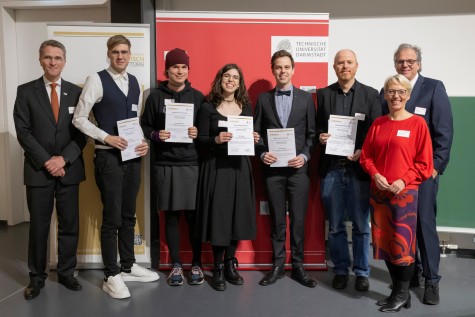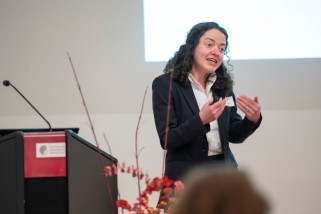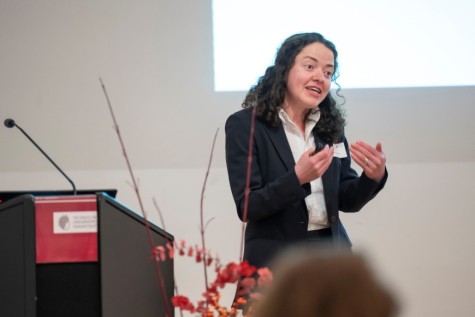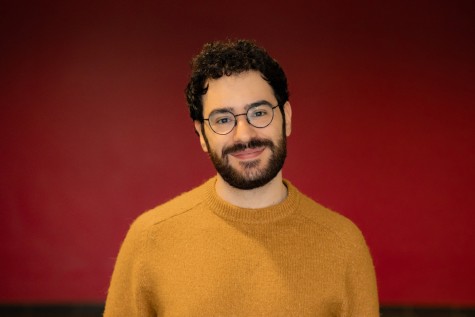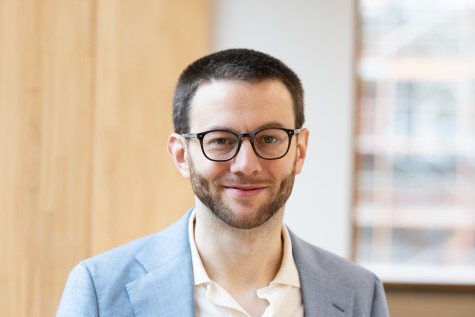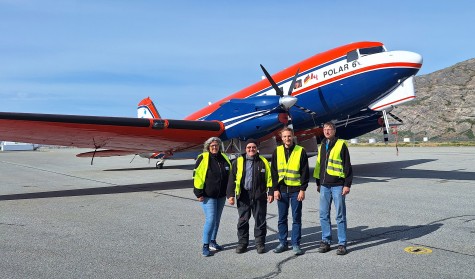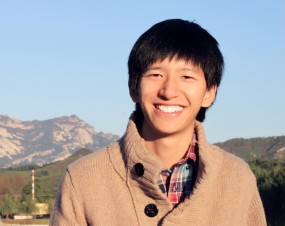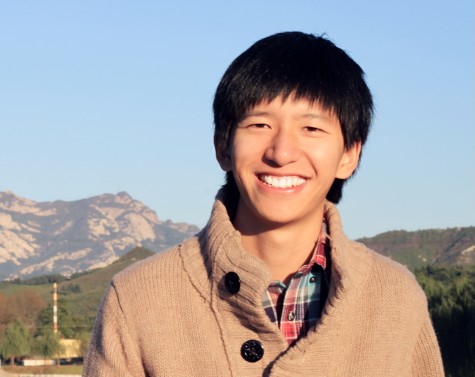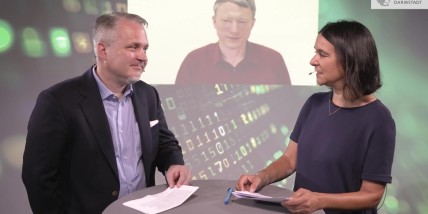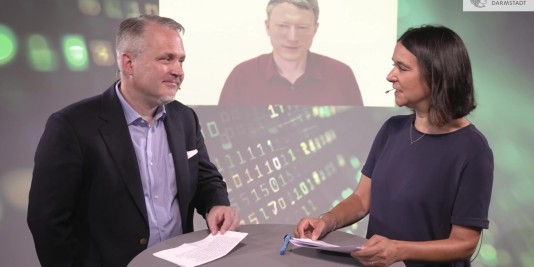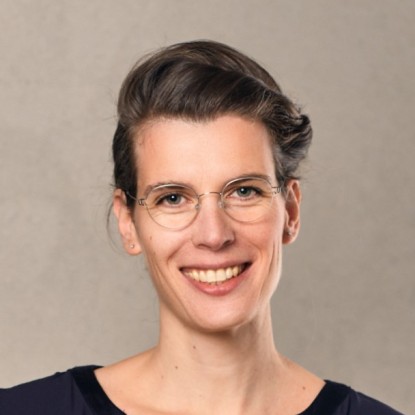-
![]() Picture: Klaus Mai
Picture: Klaus Mai![]() Picture: Klaus Mai
Picture: Klaus MaiTU presents Athene Awards for Good Teaching
2024/11/21
The Departmental Award goes to the ENCRYPTO group for the restructuring of the Digital Technology course.
On Wednesday, 20 November 2024, TU Darmstadt once again hosted its annual Teaching Day, which focuses on current issues and challenges in studying and teaching. The day concluded with the presentation of the Athene Awards for Good Teaching, donated by the Carlo and Karin Giersch Foundation. With total prize money of 46,000 euros, the Athene Awards honour outstanding achievements in teaching. This year, the great commitment of the ENCRYPTO group, led by Prof. Thomas Schneider, was rewarded with the Athene Departmental Prize Computer Science. The prize of 2,000 euros is in recognition of the restructuring of the first semester course 'Digital Technology', which the lecturers have consistently adapted to the needs and feedback of the students.
-
![]() Picture: Anne Grauenhorst, FB Informatik
Picture: Anne Grauenhorst, FB Informatik![]() Picture: Anne Grauenhorst, FB Informatik
Picture: Anne Grauenhorst, FB InformatikOffice of Student Affairs: Eva Kettel
2024/11/12
Project member for International Mentoring and Admission
Since October, Eva Kettel has been supporting the Dean's Office as a project assistant for international advising and admissions. An engineering graduate with experience in student administration and counselling, Eva will help to further optimise the processes of student counselling, admissions and onboarding of international students at the Faculty. We would like to welcome her and ask a few questions to get to know her a little better.
-
![]() Picture: Klaus Mai
Picture: Klaus Mai![]() Picture: Klaus Mai
Picture: Klaus MaiNetworked quantum computing
2024/11/11
Prof Mariami Gachechiladze receives Dr Hans Messer Foundation Prize
Professor Mariami Gachechiladze, head of the Quantum Computing Group at the Department of Computer Science at Darmstadt Technical University, is this year's recipient of the Dr Hans Messer Foundation Prize from the Hans and Ria Messer Foundation. Her research focuses on the so-called quantum internet – a network of quantum computers that could soon surpass the computing power of conventional supercomputers, particularly in the field of quantum chemistry. The prize is worth 50,000 euros.
-
![]() Picture: FB Informatik, Anne Grauenhorst
Picture: FB Informatik, Anne Grauenhorst![]() Picture: FB Informatik, Anne Grauenhorst
Picture: FB Informatik, Anne GrauenhorstNew at the Department: IRG Leader Simone Balloccu
2024/11/11
Natural Language Processing for Expert Domains (ExpNLP)
In October, Simone Balloccu joined the Department as leader of the new Independent Research Group NLP for Experts. Previously, he was a postdoctoral researcher at the Institute of Formal and Applied Linguistics (UFAL) at at the Charles University in Prague (CZ), contributing to the ERC-funded project Next-Generation Natural Language Generation (NG-NLG). The 31-year-old computer scientist received his PhD in Artificial Intelligence from the University of Aberdeen in the UK, where he was part of the Horizon 2020, Marie Skłodowska-Curie PhilHumans project. Before this, he graduated from the Università degli Studi di Cagliari (IT) with a master’s degree in computer science and first-class honours. We would like to welcome him and ask a few questions to get to know him a little better.
-
![]() Picture: TU Darmstadt/Jan-Christoph Hartung
Picture: TU Darmstadt/Jan-Christoph Hartung![]() Picture: TU Darmstadt/Jan-Christoph Hartung
Picture: TU Darmstadt/Jan-Christoph HartungStudy without worries
2024/11/06
TU and Santander award ten grade-independent scholarships
Together with Santander Universities, TU Darmstadt is awarding the 'TU Darmstadt Sorgenfrei Scholarship' worth €2,000 for the first time. The scholarship is open to all students enrolled at TU Darmstadt, regardless of their academic year. The application period runs from 23 October 2024 to 27 November 2024, 23:00.
-
![Smartphone auf dunklem Hintergrund mit UI von EMC2 auf dem Screen]() Picture: Daniela Fleckenstein
Picture: Daniela Fleckenstein![Smartphone auf dunklem Hintergrund mit UI von EMC2 auf dem Screen]() Picture: Daniela Fleckenstein
Picture: Daniela FleckensteinSecure messaging through distributed messages
2024/10/30
TU researchers enable better protection for sending sensitive information
In today's digital landscape, ensuring the privacy of online communications is more critical than ever, especially in professions that rely on confidentiality, such as law or politics. Two research groups from the Profile Topic Cybersecurity and Privacy at TU Darmstadt have developed EMC² (Encrypted Multi-Channel Communication), a method that enhances the security of sensitive messages by distributing trust across several existing communication channels. The team's approach addresses the limitations of current encryption solutions, introduces a tool that makes secure communication more accessible, and shows the ineffectiveness of government-mandated backdoors.
-
![Marc-André Kaufhold, TU Darmstadt]() Picture: Anne Grauenhorst, FB Informatik
Picture: Anne Grauenhorst, FB Informatik![Marc-André Kaufhold, TU Darmstadt]() Picture: Anne Grauenhorst, FB Informatik
Picture: Anne Grauenhorst, FB InformatikNew substitute professor: Marc-André Kaufhold
2024/10/30
Knowledge Engineering
Dr Marc-André Kaufhold has been a substitute professor for Knowledge Engineering at the Department of Computer Science since October. He completed his PhD in 2020 with summa cum laude at the research group Science and Technology for Peace and Security (PEASEC) at TU Darmstadt. His research focused on user expectations and design principles for social media and mobile applications in crisis situations. He has been a postdoctoral researcher at PEASEC since July 2020, and will start his habilitation in the Department of Computer Science in May 2023. He answered a few questions about his start.
-
![]() Picture: SdecoretMockup - stock.adobe.com / Jahir Argote Gerald
Picture: SdecoretMockup - stock.adobe.com / Jahir Argote Gerald![]() Picture: SdecoretMockup - stock.adobe.com / Jahir Argote Gerald
Picture: SdecoretMockup - stock.adobe.com / Jahir Argote GeraldRobots find their way through crowds
2024/10/29
TU Darmstadt and University of Sheffield present study at international conference
Robots can navigate efficiently through crowds of people by cleverly alternating between independent and cooperative behavior, and in such a way that they disturb the people around them as little as possible. This is the result of a study by TU Professor Roderich Groß.
-
![]() Picture: improvee design - stocj.adobe.com (KI generiert)
Picture: improvee design - stocj.adobe.com (KI generiert)![]() Picture: improvee design - stocj.adobe.com (KI generiert)
Picture: improvee design - stocj.adobe.com (KI generiert)Ensuring the safety of gender registration
2024/10/25
Cryptography enables data protection-compliant solution for official data synchronisation
A new study by the Technical University of Darmstadt in cooperation with the University of Kassel sheds light on data protection problems in data comparison between authorities, using the example of the Self-Determination Act. The researchers show that the private intersection calculation can serve as a data protection-compliant solution. In this way, the interests of both citizens and security authorities can be protected. This could be of particular importance with regard to the planned reform of the law on names.
-
![Vorstellung des DataHub Europe auf dem Digital-Gipfel des Bundesregierung mit der hessischen Digitalministerin Prof. Dr. Kristina Sinemus, den Bundesministern Dr. Robert Habeck und Dr. Volker Wissing, Co-CEO Schwarz Digits, Christian Müller, Bundeskanzler Olaf Scholz und Dr. Daniela Gerd tom Markotten, Vorständin für Digitalisierung und Technik Deutsche Bahn (v.l. nach r.).]() Picture: Deutsche Bahn/ Volker Emersleben
Picture: Deutsche Bahn/ Volker Emersleben![Vorstellung des DataHub Europe auf dem Digital-Gipfel des Bundesregierung mit der hessischen Digitalministerin Prof. Dr. Kristina Sinemus, den Bundesministern Dr. Robert Habeck und Dr. Volker Wissing, Co-CEO Schwarz Digits, Christian Müller, Bundeskanzler Olaf Scholz und Dr. Daniela Gerd tom Markotten, Vorständin für Digitalisierung und Technik Deutsche Bahn (v.l. nach r.).]() Picture: Deutsche Bahn/ Volker Emersleben
Picture: Deutsche Bahn/ Volker EmerslebenAI expertise for innovative DataHub Europe project
2024/10/23
Platform enables safe and data protection-compliant use of AI in business and science
The Technical University of Darmstadt and the Hessian Center for Artificial Intelligence hessian.AI are playing a key role in the development of DataHub Europe, a new platform for the secure use and provision of data for training AI models. This platform, which was presented by Schwarz Digits and Deutsche Bahn AG at the German government's 2024 “Digital-Gipfel”, helps companies to efficiently implement specific solutions using artificial intelligence (AI) in a manner that complies with data protection regulations.
-
![Schachspiel gegen gegen CrazyAra BOT am Schachdemonstrator]() Picture: Jannis Blüml
Picture: Jannis Blüml![Schachspiel gegen gegen CrazyAra BOT am Schachdemonstrator]() Picture: Jannis Blüml
Picture: Jannis BlümlMastering chess better with AlphaVile
2024/10/21
PhD students Johannes Czech and Jannis Blüml are researching artificial intelligence (AI) and chess
Johannes Czech and Jannis Blüml work at the Artificial Intelligence and Machine Learning Lab (AIML Lab) at TU Darmstadt. Together with Professor Kristian Kersting, head of the AIML Lab, and Hedinn Steingrimsson, a scientist specialising in AI reliability at Rice University in Houston, Texas, and Safe System 2, they published a research paper on artificial intelligence (AI) in the context of chess in August. This week they are presenting their paper at ECAI, one of the major European conferences for AI research, in Santiago de Compostela.
-
![Das „Science Team" neben der „Polar6“- Maschine (v.li.n.re.): Angelika Humbert, Christian Bischof, Max Stöhr, Daniel Steinhage.]() Picture: privat
Picture: privat![Das „Science Team" neben der „Polar6“- Maschine (v.li.n.re.): Angelika Humbert, Christian Bischof, Max Stöhr, Daniel Steinhage.]() Picture: privat
Picture: privatTU professor Christian Bischof joins polar expedition
2024/10/15
Interdisciplinary research
TU computer science professor Christian Bischof has taken part in a flight expedition to Greenland. One of the aims of the mission with the research aircraft ‘Polar6’ was to collect data for glacier simulations on the high-performance computer ‘Lichtenberg’ at TU Darmstadt.
-
![]()
![]()
Tireless commitment to human and technical networking
2024/10/14
Interview with Prof Dr Dr h.c. Ralf Steinmetz before his retirement
After 28 years at the Technical University of Darmstadt, Professor Ralf Steinmetz is retiring. Until the end of the special research centre ‘MAKI – Multi-Mechanism Adaptation for the Future Internet’, he has agreed to take on all tasks as its spokesperson. In this interview, the head of the Multimedia Communication Lab at the etit Department and Member of courtesy at the Computer Science Department looks back on this time. He talks about challenges and his grand vision, provides insights into how the collaboration between different researchers and different technical communication systems has been successful – and reveals how research and teaching can continue to be successfully organised in the future.
-
![Portrait von IRG-Leiter Shaoxiang Ji]()
![Portrait von IRG-Leiter Shaoxiang Ji]()
New at the Department: IRG-Leader Dr. Shaoxiong Ji
2024/10/10
AI and NLP for Mental Health
Dr Shaoxiong Ji has headed the new Independent Research Group (IRG) ‘AI and NLP for Mental Health’ since October. The group is funded as part of the LOEWE centre DYNAMIC and works closely with the UKP group. After completing his PhD at Aalto University, Ji worked as a postdoctoral researcher at the University of Helsinki in the field of high-performance language technology. Learn more about Ji and his research in the following interview.
-
![]()
![]()
Research for a more sensible AI
2024/10/01
An interview with Professor Kristian Kersting and Professor Markus Rohrbach, co-speakers of the RAI cluster project
The research initiative „Reasonable Artificial Intelligence’ (RAI) is one of three projects involving TU Darmstadt that are in the running for a Cluster of Excellence. Professor Kersting and Professor Rohrbach give an insight into their research – and explain who could benefit from it in the future. Part two of a three-part video series on TU Darmstadt's Cluster of Excellence applications.
Computer Science
News
Archive


